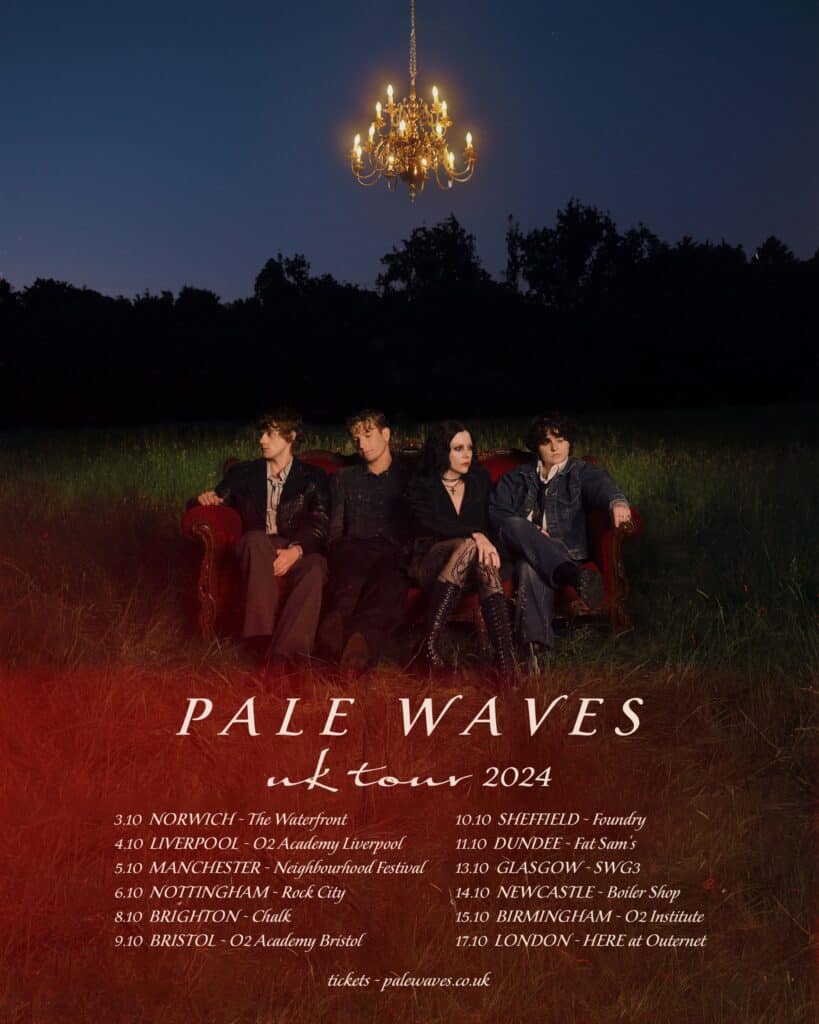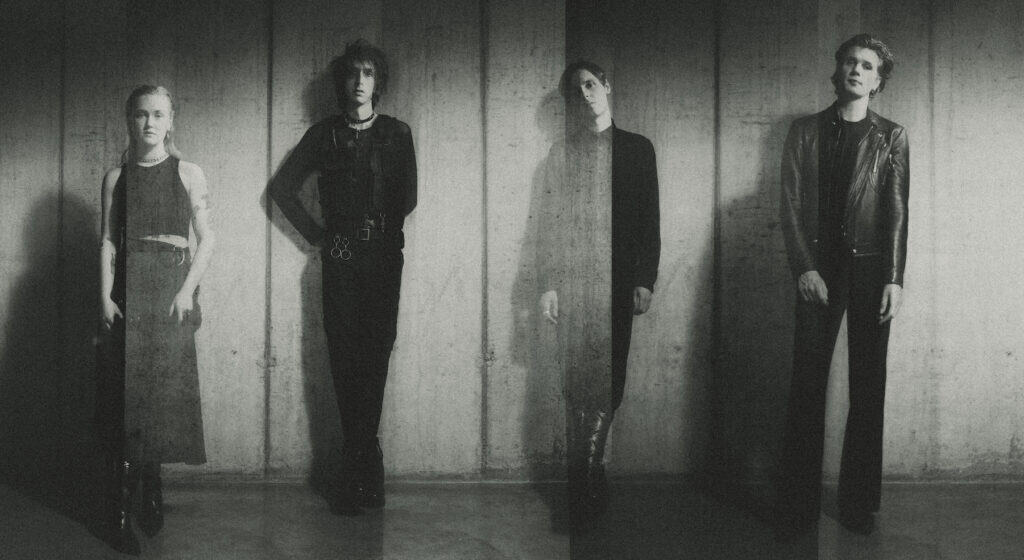Smitten is a curious verb. Seldom used in everyday speech, it’s a sensation we’ll feel, or have felt, hopefully, at some point in our lives. Pale Waves’ fourth studio album – Smitten – focuses on this fleeting emotion, giving way to a jangle-pop deepdive into the teenage diary of singer Heather Baron-Gracie.

Credit: Niall Lea
The diary provides a source of mixed emotions; naivety, remorse, and retrospective embarrassment are inexorable, but there’s also a deeper sincerity in its pages, one that compliments Pale Waves’ heart-on-sleeves style. Rather than simply reiterating past experiences of love and loss, Smitten captures the sights, sounds, and subtleties of these moments, and how they fit into a greater tale of queer coming-of-age.
Soundsphere last met with Pale Waves in the run-up to 2021’s Who Am I?, which saw the Manchester quartet trading the goth-tinged synth-pop of My Mind Makes Noises (2018) for a heavier, rock’n’roll revival of 90s’ singer-songwriter music. Maturity was a pertinent topic throughout that interview, and it remains the case even now, with Hugo Silvani (guitar) joining Soundsphere to detail the band’s current leap of faith.
As a work of reflection, Smitten is a concoction of past directions; roaring riffs are swapped for swirling walls-of-sound, symphonic synthesisers are found within a grander narrative of nostalgic longing, and Ciara Doran’s drumming, more than ever, resembles a thumping heartbeat exploding onto the sonic canvas. In totality, these twelve tracks form the band’s most definitive collection thus far. Reflecting on the songwriting process, special attention was paid towards Heather’s lyrics. “The storytelling is coming from real experiences,” says Silvani, “[so] we wanted to make sure the sounds were complementary to the story Heather was telling.”
In providing a personal soundtrack, music often spawns associations. It’s for this reason that music is sometimes used as a form of therapy for those suffering with memory loss, encouraging the brain to recall snapshots from the past. Laying the groundwork for Smitten, then, are the indie groups that soundtracked those diary pages: The Cure, The Cranberries, Cocteau Twins.
There’s no real recipe for recreating the timeless sound of these bands beyond writing lucid, detailed pop-tunes, and Smitten is full of them. Just over three-minutes long, lead single ‘Perfume’ combines goth and dream pop to sublime effect, slotting in a powerful guitar solo at the dramatic midpoint. There’s a roughness to the instrumental bridge, a free-pouring of emotion, that speaks to a newfound confidence when pulling melodies out of noise.
“That solo was actually played by Simon Oscroft who Heather wrote the song with and eventually produced it – he’s a writer based out in LA. Heather was doing sessions when she was out there and that’s one of the songs from that session.”
Beyond heavy-hitting singles, Smitten comprises a range of rewarding deep-cuts. ‘Not a Love Song’ is an instant fan-favourite that, in the music industry of decades past, would have undoubtedly been nominated, via fan consensus, as the post-album celebratory single. Its twee-pop instrumental backing and stadium-ready hook lingers in the mind indefinitely. Meanwhile, ‘Last Train Home’ kickstarts Smitten’s second half with a tale of fleeting romance built on passionate percussion, sweet guitar lines, and a multifaceted vocal display. If Silvani were to nominate a personal favourite, however, he’d opt for ‘Miss America’.
“That was one me and Heather wrote with Benjamin Francis Leftwich. Lyrically it’s great and personally I think it’s one of Heather’s best stories. It’s really open and brave, and it’s something a lot of people might resonate with. The song started off acoustically; we went in, did it, and we’ve turned it into this post-rock, 90s-esque song.”
Like much of Smitten, ‘Miss America’ possesses a cinematic edge. Promotional material for the album featured country houses, emerald fields, and open blue skies; Here, Smitten, as noted by Baron-Gracie in a recent Rolling Stone interview, takes inspiration from the relationship between memory, space, and sexuality, as explored in Park Chan-wook’s The Handmaiden (2016) and Céline Sciamma’s Portrait of a Lady on Fire (2019). In particular, Baron-Gracie subverts the conservatism of rural England by recontextualising its open canvases as a playground for queer romance. On the visual front, I’m curious: If Silvani were to pair one song from Smitten with a film soundtrack, what would he choose?
“Give me a minute… You know when someone asks you to name a film and your head goes blank? I’m gonna go with ‘Hate To Hurt You’ and Black Mirror: San Junipero (2016). It’s got an upbeat 80s’ vibe and it’s quite dancey. The lyrics are between two people and I think it could definitely fit on that.”
In contrast to the idyllic landscapes of rural England, San Junipero depicts a timeless future characterised by neon lights and diegetic sounds of the city. Smitten feels equally at home in this environment; amid the series’ dystopian forecasts of the future, Junipero offers a momentary flash of hope, in much the same way that Smitten is a reminder to one’s younger self that things will, eventually, fall into place.
Reflecting on the journey so far, I’m curious how Silvani would define the band’s success. “I can’t speak for others but.. success is happiness, right? But you’ve also got to be realistic, and you have to earn a living to be happy. We’re in a fortunate position where we’ve been doing this for eight years now and we’ve never had to get another job.”
“Over the years we’ve had the pleasure of meeting fans across different continents, hearing stories about how our songs have affected people. That’s also success, isn’t it? You’ve created art because you felt like you needed to express yourself and in expressing yourself you’ve helped someone else to express themself. That for me is the biggest thing.”
Keeping the band grounded is this close relationship with their audience. The heartfelt, jangle-pop anthemia of Smitten is a further testament to this; for not only does it reminisce the sensation of having felt smitten, with someone or something, it also details the ability to feel smitten once more, and to maintain that feeling beyond a singular recipient. Surely enough, then, Pale Waves’ discography is a love affair that keeps giving; a band that embraces the affection of its audience, while maintaining a distinct lens that balances the line between intensely personal and warmly universal.







